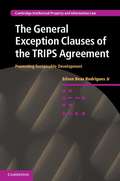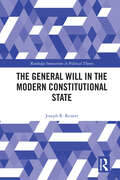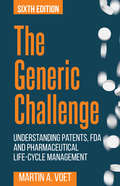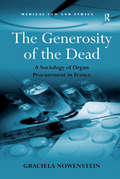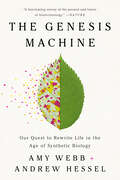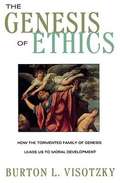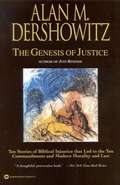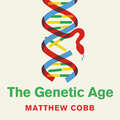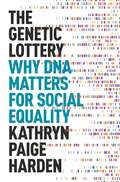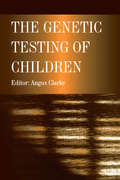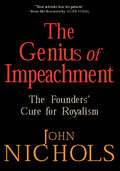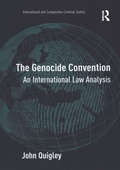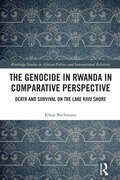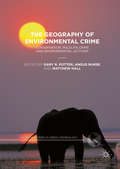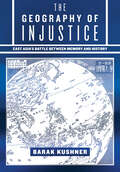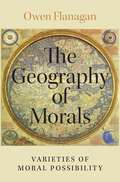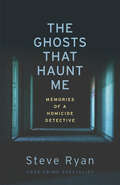- Table View
- List View
The General Exception Clauses of the Trips Agreement
by Edson Beas Rodrigues Jr.The general exception clauses of the TRIPS Agreement of the World Trade Organization permit exceptions to copyrights and to the rights conferred by trademarks, industrial designs and patents. These clauses are intended to facilitate access to diverse forms of proprietary knowledge and therefore foster the interdependent pillars of sustainable development: economic progress, realization of human rights and the conservation of the environment. In this book, Edson Beas Rodrigues, Jr argues that the TRIPS Agreement, in its current configuration, does not hinder the establishment of exceptions to intellectual property rights, devised to promote vital socioeconomic interests such as the freedom to carry out creative and inventive activities, freedom of expression, the strengthening of free competition, and increased access to educational materials by underprivileged students and to technical knowledge for humanitarian purposes.
The General Will in the Modern Constitutional State (Routledge Innovations in Political Theory)
by Joseph R. ReisertIn The General Will in the Modern Constitutional State, Joseph R. Reisert challenges standard interpretations of Rousseau, according to which his political theory either has nothing to offer the present but a radical critique or commends an illiberal, plebiscitary democracy. Reisert argues that the principles of political right Rousseau sets forth in The Social Contract are correct and that the political institutions of modern constitutional and democratic states substantially satisfy them.Rousseau’s central normative commitments – to popular sovereignty, constitutional law, representative government, the rule of law, periodic elections, universal suffrage, and equal basic rights for all – correspond closely to our contemporary understanding of what political legitimacy requires. Taking seriously Rousseau’s claim that a sort of contract lies at the foundation of every political society, Reisert offers a novel interpretation of willing a general will, arguing that the experience of formulating and acting upon a general will is as common as are the experiences of membership in a civic association and of undertaking any collective activity as a member of such an organization. Reisert expertly demonstrates that, when we recognize that a nation’s true constitution is the content of the people’s general will, we will be able to see how our political institutions (mostly) satisfy Rousseau’s normative principles of political right, and we will also discover new perspectives on constitutional politics and constitutional interpretation.The General Will in the Modern Constitutional State will be of interest to those who study Rousseau’s political thought, history of political thought, constitutionalism, and constitutional theory.
The Generic Challenge: Understanding Patents, FDA and Pharmaceutical Life-Cycle Management (Sixth Edition)
by Martin A VoetThis Sixth Edition of The Generic Challenge provides important new updates on current regulatory, legal and commercial issues affecting brand and generic pharmaceutical products, including new laws establishing generics for biologics, and changes brought
The Generosity of the Dead: A Sociology of Organ Procurement in France (Medical Law and Ethics)
by Graciela NowensteinThere has been a general assumption in the international debate surrounding organ procurement that Presumed Consent (opting-out) systems produce better results than Express Consent (opting-in) systems. This study uses the French case to challenge this widely held assumption and argues that the French presumed consent systems coexist with patterns of behaviour that in practice do not mobilize the law. It explores four key areas to current research in socio-legal studies focussing on the state and nature of social solidarity, social engineering and the changing nature of the citizen-state relations, state intervention in the event of death and discretion in use of corpses and recent modifications of the status of medical professionals as figures of authority and agents of state policy. Using material based on interviews with medical professionals, this title will be a valuable resource for researchers, academics, policy-makers and practitioners with an interest in this complex and topical subject.
The Genesis Machine: Our Quest to Rewrite Life in the Age of Synthetic Biology
by Amy Webb Andrew HesselNamed one of The New Yorker's BEST BOOKS OF 2022 SO FARThe next frontier in technology is inside our own bodies. Synthetic biology will revolutionize how we define family, how we identify disease and treat aging, where we make our homes, and how we nourish ourselves. This fast-growing field—which uses computers to modify or rewrite genetic code—has created revolutionary, groundbreaking solutions such as the mRNA COVID vaccines, IVF, and lab-grown hamburger that tastes like the real thing. It gives us options to deal with existential threats: climate change, food insecurity, and access to fuel. But there are significant risks. Who should decide how to engineer living organisms? Whether engineered organisms should be planted, farmed, and released into the wild? Should there be limits to human enhancements? What cyber-biological risks are looming? Could a future biological war, using engineered organisms, cause a mass extinction event? Amy Webb and Andrew Hessel&’s riveting examination of synthetic biology and the bioeconomy provide the background for thinking through the upcoming risks and moral dilemmas posed by redesigning life, as well as the vast opportunities waiting for us on the horizon.
The Genesis of Ethics
by Burton L. VisotzkyBurton L. Visotzky, one of America's most respected scholars of religion, guides readers through a close reading of the narratives of the Book of Genesis, exposing their brutal power and revealing how their moral dilemmas apply to ethical issues we face in our lives today. Rabbi Visotzky has led highly regarded seminars, attended by novelists, poets, editors, filmmakers and critics, Fortune 500 CEOs, bankers, and attorneys. He also was a major participant in Bill Moyers' PBS Genesis series. His reading of Genesis opens the door to moral development for all readers--Christians, Jews, Muslims, and secularists. As Burton Visotzky says, the Book of Genesis seems to be, at least on first reading, "an ugly little soap opera about a dysfunctional family . . . a story about rape, incest, murder, deception, brute force, sex, and blood lust. But these stories reveal much about human dilemmas and ethical problems that mirror our own lives. By delving into the lives of Abraham, Sarah, Isaac, and Esau and holding up these characters of Scripture to the light of critical inquiry, Burton Visotzky reveals much that is fresh and useful about ethics and morality. "He is a rabbi who is earthy, playful, and full of insight, who refuses to draw a veil over the dark side of the Bible or of our own contemporary experience. " --Thomas Cahill, author of How the Irish Saved Civilization "[Visotzky] has a wonderfully earthy, human touch to his commentary, a perspective that can be especially refreshing for Christians who have seen the 'Old Testament' sanitized or ignored by their own tradition. " --San Francisco Chronicle "Thrilling original insights . . . a new way to see and feel these old, old sentences. " --The New York Times Magazine "Visotzky delights in turning the gem of each story so that its facets, especially the darkest ones, gleam out at us. . . . The Genesis of Ethics is a unique contribution to Bible discussion. . . . One can only applaud and thank him. " --Naomi Rosen, Congress Monthly
The Genesis of Justice: Ten Stories of Biblical Injustice that Led to the Ten Commandments and Modern Law
by Alan M. DershowitzFrom Gethesmane to the Grave: A commentary on the Passion Narratives in the Four Gospels
The Genetic Age: Our Perilous Quest To Edit Life
by Matthew Cobb'Brilliant .. I cannot recommend this book strongly enough' - Henry Marsh, New Statesman (about The Idea of the Brain)A new gene editing technology, invented just seven years ago, has turned humanity into gods. Enabling us to manipulate the genes in virtually any organism with exquisite precision, CRISPR has given scientists a degree of control that was undreamt of even in science fiction.But CRISPR is just the latest, giant leap in a long journey to master genetics. The Genetic Age shows the astonishing, world-changing potential of the new genetics and the possible threats it poses, sifting between fantasy and the reality when it comes to both benefits and dangers.By placing each phase of discovery, anticipation and fear in the context of over fifty years of attempts to master the natural world, Matthew Cobb, the Baillie-Gifford-shortlisted author of The Idea of the Brain, weaves the stories of science, history and culture to shed new light on our future. With the powers now at our disposal, it is afuture that is almost impossible to imagine - but it is one we will create ourselves.
The Genetic Lottery: Why DNA Matters for Social Equality
by Kathryn Paige HardenA provocative and timely case for how the science of genetics can help create a more just and equal societyIn recent years, scientists like Kathryn Paige Harden have shown that DNA makes us different, in our personalities and in our health—and in ways that matter for educational and economic success in our current society.In The Genetic Lottery, Harden introduces readers to the latest genetic science, dismantling dangerous ideas about racial superiority and challenging us to grapple with what equality really means in a world where people are born different. Weaving together personal stories with scientific evidence, Harden shows why our refusal to recognize the power of DNA perpetuates the myth of meritocracy, and argues that we must acknowledge the role of genetic luck if we are ever to create a fair society.Reclaiming genetic science from the legacy of eugenics, this groundbreaking book offers a bold new vision of society where everyone thrives, regardless of how one fares in the genetic lottery.
The Genetic Testing of Children
by Angus ClarkeThis book, written by a leading geneticist, examines the ethical and social issues raised by the genetic testing of children. The opinions of geneticists, ethicists and affected families are all included to give a balanced view of this controversial field. Issues covered include confidentiality, potential abuses of genetic information (eg the use of test results by insurance companies) and the value of predictive genetic testing.The aim of the book is to improve awareness of the complexity of the issues raised and provide suggestions as to how the discussions must develop - it therefore raises new questions as well as answering those that already exist.
The Geneva Consensus
by Pascal LamyAs Director-General of the World Trade Organization, Pascal Lamy chaired the Doha Round of negotiations and witnessed a rapidly changing international trade environment. In his first book since leaving the WTO, Lamy reflects on his time there and outlines his views on the significance of open trade in generating global economic growth, reducing poverty and creating jobs around the world. He argues that trade can only act as a motor for growth if the correct mix of domestic and international economic and social policies is in place. This approach the 'Geneva Consensus' requires deeper cooperation and policy coherence between the international organizations active in setting international economic, social and political policies. The Geneva Consensus describes the ongoing efforts to put this into effect, calling for more effective global governance to tackle the challenges of globalization. It also examines relationships between trade and the key social, economic and political issues of our time.
The Genius of Impeachment: The Founders' Cure for Royalism
by John NicholsA more-timely-than-ever argument that impeachment is an essential American institution from the author of Horsemen of the Trumpocalypse. This surprising and irreverent book by one of America&’s leading political reporters makes the case that impeachment is much more than a legal and congressional process—it is an essential instrument of America&’s democratic system. Articles of impeachment have been brought sixty-two times in American history. Thomas Jefferson himself forwarded the evidence for impeachment of the first federal official to be removed under the process—John Pickering in 1803. Impeachment is as American as apple pie. The founders designed impeachment as one of the checks against executive power. As John Nichols reveals in this fascinating look at impeachment&’s hidden history, impeachment movements—in addition to congressional proceedings themselves—have played an important role in countering an out-of-control executive branch. The threat of impeachment has worked to temper presidential excesses and to reassert democratic values in times of national drift. The Genius of Impeachment makes clear that we sorely need such a movement today, and that both the president and vice president deserve impeachment. In the spirit of maverick congressmember Henry B. González, who introduced articles of impeachment against both George H. W. Bush and Ronald Reagan for making war without a declaration, this book is a fearless call to Americans to hold our leaders accountable to democracy. &“Arguing that regular elections are an insufficient democratic guardian against corrupt officeholders . . . this work relies on its power-to-the-people persona for its appeal.&” —Booklist
The Genocide Convention: An International Law Analysis (International and Comparative Criminal Justice)
by John QuigleyThe Genocide Convention explores the question of whether the law and genocide law in particular can prevent mass atrocities. The volume explains how genocide came to be accepted as a legal norm and analyzes the intent required for this categorization. The work also discusses individual suits against states for genocide and, finally, explores the utility of genocide as a legal concept.
The Genocide Debate
by Donald W. BeachlerNeither a case study of a particular genocide nor a work of comparative genocide, this book explores the political constraints and imperatives that motivate debates about genocide in the academic world and, to a lesser extent, in the political arena. The book is an analysis of the ways that political interests shape discourse about genocide.
The Genocide in Rwanda in Comparative Perspective: Death and Survival on the Lake Kivu Shore (Routledge Studies in African Politics and International Relations)
by Klaus BachmannThis book combines social science concepts, history and transitional justice studies to examine the social dynamics, specific actors and ideologies involved in the genocide in Rwanda and examines what makes this genocide a unique case of mass violence and political transition compared with other cases of mass violence.It analyzes the conditions necessary for people to engage in intimate violence against their neighbors and family members, asking what inclines “ordinary men” (and women) to join gangs of killers and what role policies, authorities, ideologies, emotions, negotiations and material incentives play in the mobilization for mass atrocities. Comparing genocidal events elsewhere in time and location, the book provides an up-to-date overview of the 1994 events in Rwanda and offers new and surprising insights from previously inaccessible archival records, explaining how to facilitate foreign intervention in the future.This book is of key interest to scholars and students of African politics, genocide studies and more broadly to security studies, conflicts and conflict-resolution studies, decolonization studies and contemporary and comparative history.
The Genome Defense: Inside the Epic Legal Battle to Determine Who Owns Your DNA
by Jorge L. ContrerasIn this riveting, behind-the-scenes courtroom drama, a brilliant legal team battles corporate greed and government overreach for our fundamental right to control our genes. When attorney Chris Hansen learned that the U.S. government was issuing patents for human genes to biotech companies, his first thought was, How can a corporation own what makes us who we are? Then he discovered that women were being charged exorbitant fees to test for hereditary breast and ovarian cancers, tests they desperately needed—all because Myriad Genetics had patented the famous BRCA genes. So he sued them. Jorge L. Contreras, one of the nation&’s foremost authorities on human genetics law, has devoted years to investigating the groundbreaking civil rights case known as AMP v. Myriad. In The Genome Defense Contreras gives us the view from inside as Hansen and his team of ACLU lawyers, along with a committed group of activists, scientists, and physicians, take their one-in-a-million case all the way to the U.S. Supreme Court. Contreras interviewed more than a hundred key players involved in all aspects of the case—from judges and policy makers to ethicists and genetic counselors, as well as cancer survivors and those whose lives would be impacted by the decision—expertly weaving together their stories into a fascinating narrative of this pivotal moment in history. The Genome Defense is a powerful and compelling story about how society must balance scientific discovery with corporate profits and the rights of all people.
The Geography of Environmental Crime
by Matthew Hall Gary R. R. Potter Angus NurseThis book critically examines both theory and practice around conservation crimes. It engages with the full complexity of environmental crimes and different responses to them, including: poaching, conservation as a response to wildlife crime, forest degradation, environmental activism, and the application of scientific and situational crime prevention techniques as preventative tools to deal with green crime. Through the contributions of experts from both the social and ecological sciences, the book deals with theoretical and practical considerations that impact on the effectiveness of contemporary environmental criminal justice. It discusses the social construction of green crimes and the varied ways in which poaching and other conservation crimes are perceived, operate and are ideologically driven, as well as practical issues in environmental criminal justice. With contributions based in varied ideological perspectives and drawn from a range of academic disciplines, this volume provides a platform for scholars to debate new ideas about environmental law enforcement, policy, and crime prevention, detection and punishment.
The Geography of Good and Evil: Philosophical Investigations
by Andreas KinnegingDo good and evil exist? Absolutely. In this bracing book, the eminent Dutch philosopher Andreas Kinneging turns fashionable thinking on its head, revealing how good and evil are objective, universal, and unchanging—and how they must be rediscovered in our age. In mapping the geography of good and evil, Kinneging reclaims, and reintroduces us to, the great tradition of ancient and Christian thought. Traditional wisdom enables us to address the eternal questions of good and evil that confront us in both public and private life. Though it is common to accept uncritically the blessings of modernity and its intellectual sources, the Enlightenment and Romanticism, Kinneging shows that traditional thinking is richer and more realistic. Indeed, we see how, in more than a few respects, the Enlightenment and Romanticism brought not progress but deterioration. Kinneging skillfully reformulates and defends the insights of traditional thinking for today's readers, demonstrating how an objective morality is to be understood and how we can know what morality demands of us. At a time when the traditional virtues have practically disappeared from our language (that is, all but one—"tolerance"), he lays out the foundations of virtue and vice. Ultimately, Kinneging reveals the lasting significance of these seemingly archaic notions—to our own lives, to our families, to our culture, and to civilization. This profound, award-winning work establishes Andreas Kinneging as one of our wisest moral philosophers.
The Geography of Injustice: East Asia's Battle between Memory and History
by Barak KushnerIn The Geography of Injustice, Barak Kushner argues that the war crimes tribunals in East Asia formed and cemented national divides that persist into the present day. In 1946 the Allies convened the Tokyo Trial to prosecute Japanese wartime atrocities and Japan's empire. At its conclusion one of the judges voiced dissent, claiming that the justice found at Tokyo was only "the sham employment of a legal process for the satisfaction of a thirst for revenge." War crimes tribunals, Kushner shows, allow for the history of the defeated to be heard. In contemporary East Asia a fierce battle between memory and history has consolidated political camps across this debate. The Tokyo Trial courtroom, as well as the thousands of other war crimes tribunals opened in about fifty venues across Asia, were legal stages where prosecution and defense curated facts and evidence to craft their story about World War Two. These narratives and counter narratives form the basis of postwar memory concerning Japan's imperial aims across the region. The archival record and the interpretation of court testimony together shape a competing set of histories for public consumption. The Geography of Injustice offers compelling evidence that despite the passage of seven decades since the end of the war, East Asia is more divided than united by history.
The Geography of Morals: Varieties of Moral Possibility
by Owen FlanaganThe Geography of Morals is a work of extraordinary ambition: an indictment of the parochialism of Western philosophy, a comprehensive dialogue between anthropology, empirical moral psychology, behavioral economics, and cross-cultural philosophy, and a deep exploration of the opportunities for self, social, and political improvement provided by world philosophy. Flanagan presses the much more exciting possibility that cross-cultural philosophy provides opportunities for exploring the varieties of moral possibility, learning from other traditions, and for self, social, and political improvement. There are ways of world making in other living traditions - Confucian, Daoist, Buddhist, Hindu, Jain, Muslim, Amerindian,and African - that citizens in Western countries can benefit from. Cross-cultural learning is protection against what Alasdair MacIntyre refers to as being "imprisoned by one's upbringing. " Flanagan takes up perennial topics of whether there is anything to the idea of a common human nature, psychobiological sources of human morality, the nature of the self, the role of moral excellence in a good human life, and whether and how empirical inquiry into morality can contribute to normative ethics. The Geography of Morals exemplifies how one can respectfully conceive of multiculturalism and global interaction as providing not only opportunities for business and commerce, but also opportunities for socio-moral and political improvement on all sides. This is a book that aims to change how normative ethics and moral psychology are done.
The German Chambers of Commerce and Industry: Self-governance, Service, the General Representation of Interests and the Dual System of Professional Education (Practical Wisdom for Sustainable Organizations)
by Eberhard Sasse Andre HabischThis open access book examines a particular factor in the enduring international success of German companies. Beyond industrial specialization, peaceful labor relations, local financial markets and the “miracle of the Mittelstand”, it focuses on a characteristic aspect of governance within the German economy: The Chambers of commerce and industry. Important characteristics of the Chamber system are emphasized - including obligatory membership for firms as well as participatory rules of their self-administration. In turn, the book examines the institution’s self-governance, its services, and its mission regarding the general representation of interests. Moreover, the book also identifies the advancement of the dual system of professional education as a central element of the Chamber system. Following an introduction about how the Chamber system works, interviews, case studies and historical explanations help to exemplify the true spirit inherent to this form of representation. In particular, they reveal the essence of how the Chambers contribute to the global success of German companies and foster their corporate responsibility in a practical way. Given its scope, the book will be of particular interest to professionals, policymakers and researchers concerned with how institutional organization can support commerce and industry for the public good. The book was developed in collaboration with Laura Sasse and the Practical Wisdom Society.
The German Prosecution Service
by Shawn Marie BoyneAcclaimed as the "the most objective prosecutors in the world", the German prosecution service has long attracted the attention in the past of comparative law scholars. At first glance, the institutional position and statutory mandate of German prosecutors indicate that that reputation is well-deserved. Unfortunately, the introduction of charge-bargaining has opened the door to criticism that German prosecutors have abandoned their role of objective decision-makers. Using interview data collected from interviews with German prosecutors themselves as well as quantitative data, the book uses the actual voices of German prosecutors to show how real-world constraints, rather than changes in the law, undermine the ability of German prosecutors to objectively seek the truth. The book will take readers behind closed doors where prosecutors discuss case decisions and unveil the realities of practice. As a result, it will critically revise previous studies of German prosecution practices and offer readers a well-researched ethnographic analysis of actual German decision-making practices and the culture of the prosecution service. Unlike prosecutors in America's adversarial system, whom critics claim are driven by a "conviction-mentality" and gamesmanship, German prosecutors are institutionally positioned to function as (at least semi-)judicial officials dedicated to finding a case's objective truth. The book argues that, organizational incentives and norms, rather than the boundaries of the law determinately shapes how prosecutors investigate and prosecute crime in Germany.
The German-Soviet War: Combat, Occupation, and Legacies
by Jeff Rutherford Robert Von MaierThe German-Soviet War revises the conflict's generally accepted understanding through case studies, demonstrating the complexity of the war at the local level. The contributors assembled by Jeff Rutherford and Robert von Maier examine the multiplicity of experiences of individuals caught in this savage war, starting with the German war of annihilation launched against Soviet state and society in June 1941. This detailed collection shows that the particular nature of the war in the east resulted from an intertwining of military, ideological, and economic motives. The German-Soviet War puts Germany's murderous policies toward Soviet Jews and prisoners of war, and the justification for these policies and actions within the ranks of the army, into the larger context of battlefield events. The neglected topic of the destructive German scorched-earth retreats receives detailed analysis, demonstrating the importance of ideology and economic thinking in the German army's war. The difficulty in reconciling economic and ideological considerations also played a prominent role in Soviet attempts to rebuild after the war. The German-Soviet War not only brings attention to these devastating events but also revises the general narrative of the war. By internationalizing the conflict through examinations into the various Axis and Allied nations and peoples who participated in the fighting, this volume provides new ways of conceptualizing their motivations, actions, and importance in its eventual outcome. Together, the contributions to The German-Soviet War provide new ways of examining the defining conflict of the Second World War.
The Ghosts That Haunt Me: Memories of a Homicide Detective
by Steve RyanAfter years working in homicide, retired Toronto detective Steve Ryan reflects on six cases he will never forget.Retired detective Steve Ryan worked in Toronto’s homicide squad for over a decade. For Ryan, the stories of Toronto’s most infamous crimes were more than just a headline read over morning coffee — they were his everyday life. After investigating over one hundred homicides, Ryan can never forget the tragedies and the victims, even after his retirement from the police force. In The Ghosts That Haunt Me, he reflects on six of the many cases that greatly impacted him — seven people whose lives were senselessly taken — and that he still thinks about nearly every day. While the stories are hard to tell for Ryan, they were harder to live through. Yet somewhere between the crimes and the heartache is a glimmer of hope that good eventually does prevail and that healing can come after grief.
The Ghostwriters: Lawyers and the Politics behind the Judicial Construction of Europe (Cambridge Studies in Law and Society)
by Tommaso PavoneThe European Union is often depicted as a cradle of judicial activism and a polity built by courts. Tommaso Pavone shows how this judge-centric narrative conceals a crucial arena for political action. Beneath the radar, Europe's political development unfolded as a struggle between judges who resisted European law and lawyers who pushed them to embrace change. Under the sheepskin of rights-conscious litigants and activist courts, these “Euro-lawyers” sought clients willing to break state laws conflicting with European law, lobbied national judges to uphold European rules, and propelled them to submit noncompliance cases to the European Union's supreme court – the European Court of Justice – by ghostwriting their referrals. By shadowing lawyers who encourage deliberate law-breaking and mobilize courts against their own governments, The Ghostwriters overturns the conventional wisdom regarding the judicial construction of Europe and illuminates how the politics of lawyers can profoundly impact institutional change and transnational governance.
